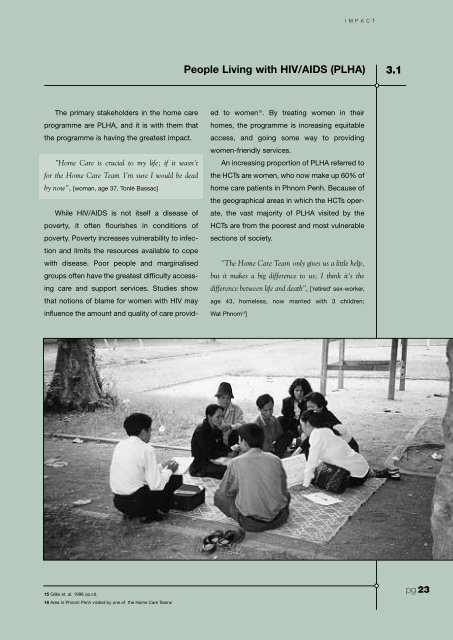PDF File - hivpolicy.org
PDF File - hivpolicy.org
PDF File - hivpolicy.org
- No tags were found...
Create successful ePaper yourself
Turn your PDF publications into a flip-book with our unique Google optimized e-Paper software.
IMPACTPeople Living with HIV/AIDS (PLHA) 3.1The primary stakeholders in the home careprogramme are PLHA, and it is with them thatthe programme is having the greatest impact."Home Care is crucial to my life; if it wasn'tfor the Home Care Team I'm sure I would be deadby now", [woman, age 37, Tonlé Bassac]While HIV/AIDS is not itself a disease ofpoverty, it often flourishes in conditions ofpoverty. Poverty increases vulnerability to infectionand limits the resources available to copewith disease. Poor people and marginalisedgroups often have the greatest difficulty accessingcare and support services. Studies showthat notions of blame for women with HIV mayinfluence the amount and quality of care provid-ed to women 15 . By treating women in theirhomes, the programme is increasing equitableaccess, and going some way to providingwomen-friendly services.An increasing proportion of PLHA referred tothe HCTs are women, who now make up 60% ofhome care patients in Phnom Penh. Because ofthe geographical areas in which the HCTs operate,the vast majority of PLHA visited by theHCTs are from the poorest and most vulnerablesections of society."The Home Care Team only gives us a little help,but it makes a big difference to us; I think it's thedifference between life and death", ['retired' sex-worker,age 43, homeless, now married with 3 children;Wat Phnom 16 ]15 Gilks et. al. 1998 op.cit.16 Area in Phnom Penh visited by one of the Home Care Teamspg 23
















